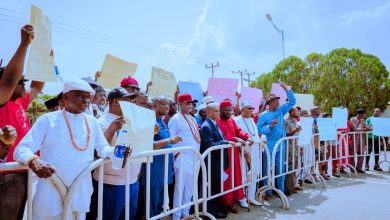Ondo’s $50bn refinery, free trade zone project moves forward as joint venture begins technical work

Ondo State’s long-envisioned refinery and free trade zone project is taking concrete shape following the formalisation of a joint venture agreement between the state government and Backbone Infrastructure Nigeria Limited (BINL).
The partnership, which has now commenced preliminary technical activities including site assessments, is targeted at transforming Ilaje Local Government Area of the state into a major industrial corridor.
The latest momentum comes on the heels of BINL’s announcement that it has secured funding commitments exceeding $50 billion for the development of a 500,000-barrel-per-day refinery and the Sunshine Free Trade Zone.
The financing, one of the largest single private-sector packages proposed for Nigeria’s downstream oil and gas sector was arranged through a strategic collaboration with NEFEX Holdings Limited of Canada.
In a weekend statement, Wale Adekola, Vice President of Corporate Services at BINL, confirmed that the agreement has given rise to a new operating entity, Sunshine Joint Venture Infrastructure Limited, which would serve as the delivery vehicle for the refinery and associated industrial projects.
Adekola explained that the joint venture was established after months of technical presentations and data exchanges with the Ondo State Investment Promotion Agency (ONDIPA).
The vehicle brings together Backbone Infrastructure Limited, NEFEX Petro Line Limited, and Cooldeal Limited, working alongside the state government through ONDIPA.
Representative teams for the partners include Navid, Egbal and MJ for NEFEX; BINL directors Henry Owonka and Steve Dike; and Namvapor Maryam Fard for Cooldeal.
To advance the next phase of work, ONDIPA officials recently led a combined delegation of joint-venture partners and international engineering consultants from China Harbour, China Engineering, and Honeywell on a site tour of the Ilaje waterways.
The exercise covered proposed locations for the refinery complex and free-trade operations, and also featured early engagements with relevant host communities.
Describing the field visit as “a significant step demonstrating readiness to transition from planning to structured execution,” Adekola noted that the team had earlier paid a courtesy visit to Governor Lucky Aiyedatiwa.
The delegation was led by BINL Chairman and former Senate President, Senator Ken Nnamani.
Governor Aiyedatiwa welcomed the investment team and applauded their decision to situate such a large-scale initiative in the state.
He emphasised that the project aligns with Ondo’s industrialisation blueprint and Nigeria’s wider efforts to diversify the economy.
“We are committed to creating the right environment for this partnership to flourish and for all stakeholders to achieve mutually rewarding outcomes,” he assured.
The delegation also visited the Olugbo of Ugbo Kingdom, Oba Frederick Obateru Akinruntan, who declared full royal support.
The monarch highlighted the potential of the proposed hub to transform the coastal belt of Ilaje into a major economic zone.
Receiving the foreign partners warmly, he pledged community cooperation and security, adding: “Ugbo Kingdom will give its full backing to ensure the success of this transformative project.”
According to Adekola, the joint-venture partners intend not only to deliver a technically robust industrial complex but also to invest in community development.
Planned social interventions include modern hospitals, schools, potable water infrastructure, and newly planned settlement clusters.
He added that all parties are aligned on the project’s design blueprint and committed to executing each stage meticulously to deliver “a world-class industrial development.”
The refinery and free trade zone are central to Ondo State’s long-term economic plan to leverage its extensive coastline for energy and manufacturing investments.
Earlier concept designs for the corridor include pipelines, tank farms, modular and full-scale refinery units, export-processing facilities, fabrication sites, and a specialised logistics network intended to draw major global players.
Once operational, the refinery is expected to significantly boost domestic fuel supply, support ancillary industries with feedstock, and export refined petroleum products.
It will also feature integrated storage terminals, loading bays, maritime access routes, and internal transport infrastructure as part of its expansive layout.



